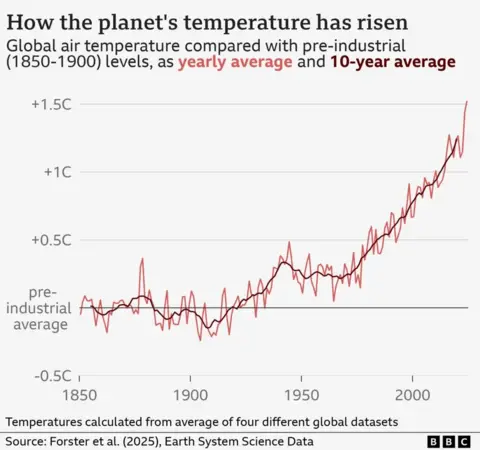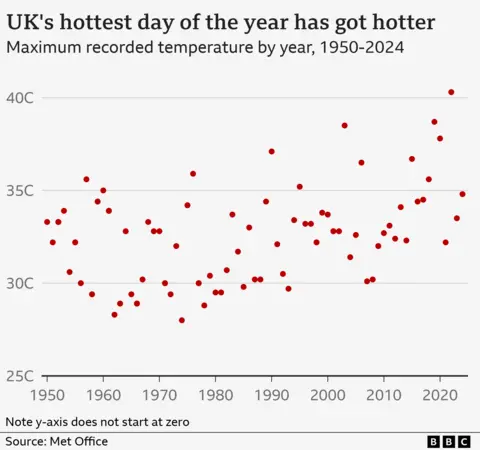Britain is hotting up – but is home air-con the answer?
2 hours agoGeorge SandemanBBC News

 BBC
BBCA summer of soaring temperatures has come to an end with more Britons turning to air conditioning to cope with the heat – but should you buy one too?
The benefits of air-con are well documented. Studies show that hot days make working and studying less efficient and a good night’s sleep more difficult to achieve.
However, it uses extra electricity – the price of which remains much higher now than it was a few years ago – and environmental groups are concerned about the chemicals used to cool air.
Some consumers also worry air-con devices spread viruses – but that hasn’t stopped sales rising.
John Lewis tells us it has been selling 8% more portable air-con units over the last year compared to the year before.
Currys saw a jump in orders of 140% in June – the second warmest ever recorded – compared with the same month in 2024.
BBC News spoke to three experts to find out if environmental, financial and medical concerns about air conditioning are well-founded.
Is air-con bad for the environment?
“It shouldn’t be a choice between staying cool and saving the planet,” says Avipsa Mahapatra of the Environmental Investigation Agency (EIA).
The charity she works for looks at companies whose business practices damage the environment.
She is particularly concerned about how the cooling chemicals used in air-con devices contribute to climate warming.
Most air conditioners in the world use some form of hydrofluorocarbon (HFC), which are extremely potent greenhouse gases that trap substantially more heat in the atmosphere than an equivalent amount of carbon dioxide (CO2).


An HFC can be thousands or tens of thousands of times more potent depending on the type, according to the US Environmental Protection Agency.
HFCs can escape into the atmosphere if air-con units are damaged or not properly disposed of. Poorly made ones can also leak the chemical gradually.
Ms Mahapatra thinks manufacturers should use less damaging chemicals in their units, like they do now for some large refrigerators sold to supermarkets.
This change followed campaigns led by environmental groups like EIA but such a transition is yet to happen in the air conditioning industry as HFCs remain an affordable and effective cooling chemical.
Until then Ms Mahapatra advises consumers to dispose of their air-con devices through recycling centres so the HFC inside can be properly reused or destroyed.
She also wants people to buy more energy efficient units. It does mean spending more money up front but, in the long run, it can save cash by using less electricity.
Consumers can also do this by only using it on hot days.
That’s exactly what Ed Hezlet does. He uses his portable air conditioning device approximately 15 days a year to keep his bedroom cool and help him sleep better.
Is air-con expensive to use?
He says he bought his device a few years ago for around £300 and that it is worth the comfort it provides, including the running costs.
“My portable unit delivers about 2.6 kilowatts of cooling. It’s about one kilowatt of electricity, so it’s probably about 22p an hour for me to run. It’s not trivial.”
If it was really hot and he had it switched on all day and night, that would cost him just over £5 – though this would cool just one room and not his whole house.
Research by the University of East London published in April found that about 80% of British homes overheated in summer.
According to the survey they carried out, the use of air conditioning had increased sharply in the decade to 2022 – when around 21% of homes used some form of it.
In 2011, a government survey found only 2-3% of households had a portable or fixed air cooling unit of some kind.
BSRIA, a research firm, estimated this figure was between 3-5% for the period between 2013-19.


Mr Hezlet works as an energy analyst for the Centre for British Progress thinktank, which last month published a report calling for legal changes that would make it more affordable for people to install air conditioning systems capable of cooling their entire home.
One proposed change is the government’s boiler upgrade scheme, which grants money to homeowners replacing their gas boilers with alternatives that don’t rely on fossil fuels – such as heat pumps and biomass boilers.
The government wants to reduce the UK’s carbon emissions by encouraging people to use heat pumps powered with clean energy from sources like wind and solar.
Currently the scheme does not include air-to-air heat pumps as an alternative but Mr Hezlet thinks it should because they can provide cooling as well as heating.
“My view is that if you can offer benefits to consumers – carrots and not just sticks – then you’ve got more chance of driving heat pump adoption,” he says.
Using air-to-air heat pumps mean consumers can solve two problems with one piece of technology – reducing their carbon emissions and cooling them on hot days. But they’re pricey without the government grant.
The cost of installing this kind of heat pump varies depending on what kind of home you have and the heating and water system already in it; estimates vary from £4,000-£10,000.
The grant for heat pumps eligible under the boiler upgrade scheme – none of which can provide air-con – is worth £7,500 and British Gas says the average installation cost to their customers in 2023 was £5,690.
Does air-con make you ill?
One of the most common concerns among people considering an air conditioner is whether or not it makes them ill.
Dr Primrose Freestone, an associate professor in clinical microbiology at the University of Leicester, says it can lead to symptoms for what is known as sick building syndrome.
“What air conditioning does is to change the composition of the air, so the air is cooler and the air is drier. The effect on you is it dries out your mucus airways in your nose and the back of your throat.”
This can lead to some people developing issues such as a cough or runny nose but air-con only leads to serious problems like infections when units are poorly maintained or unclean.
“Viruses can be transmitted, and bacteria as well, by air conditioning systems because they cool air. That means you get condensation and you get water build-up unless the air conditioning system is well maintained.”
Legionnaires’ disease is one of the more common infections that can arise from poorly kept units. In rare cases, they can spread diseases not usually considered airborne.
“In China, at a kindergarten, the norovirus, which is usually transmitted from hand to mouth or from surfaces, got into the air and infected half of the class.”
Dr Freestone says instances like this can be avoided if the air-con units are of good quality, kept clean and has its filters changed regularly in line with manufacturers’ guidance.
“That way your air-con system is less likely to be a source of infection and irritation and more likely to actually make the air cleaner.”
For Ms Mahapatra, the need for air-con is clear – it reduces heat-related deaths – but the industry needs to change.
“I think air conditioning really represents a paradox right now,” she says.
“It can save lives during heatwaves and it is necessary for human sustenance in many ways, but these specific [HFC] refrigerants are potent greenhouse gases.”
She says this is unnecessary given the technology available today and thinks it is important consumers demand their manufacturers adapt.
“In a warming world, cooling is no longer a luxury.”
More Weekend PicksUK heatwavesClimate